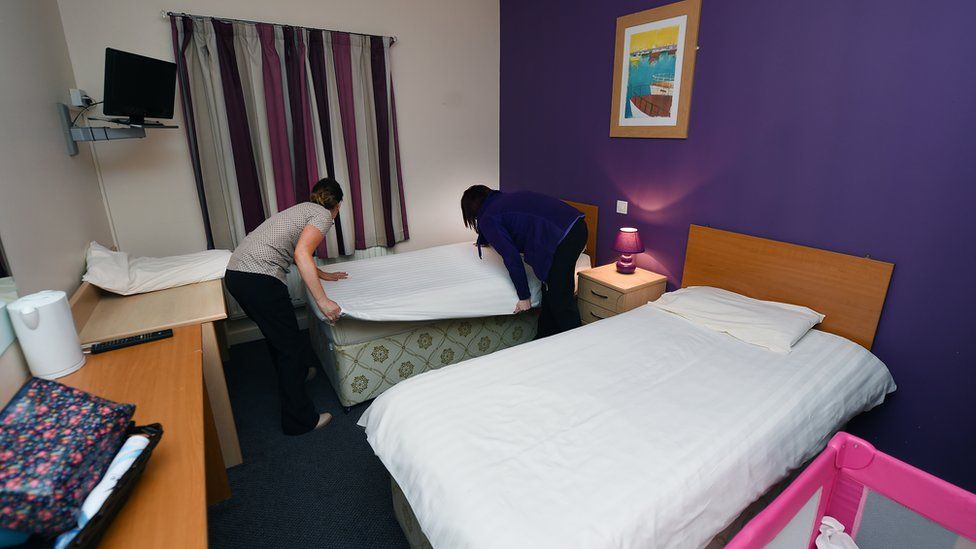Asylum accommodation: Some NI staff 'not checked or trained'
- Published

Some staff working with children and vulnerable adults in asylum accommodation in Northern Ireland had not undergone checks or training, a report has found.
The inspection found families with children were placed into unregulated emergency accommodation.
The report is by the independent chief inspector of borders and immigration.
The Home Office has said that work was underway to undertake recommendations made within the report.
The report came following a request from senior officials within the Home Office following concerns relating to safeguarding issues within some hotels housing asylum seekers in Northern Ireland.
Among the key concerns flagged in the report was the length of time that asylum-seeking families were having to spend in hotels in Northern Ireland.
As of 28 May 2023, the average length of stay was 201 days, but many families who met with inspectors had been there for more than 12 months.
The contingency accommodation is designed to be an interim measure until longer-term accommodation then becomes available.
The report also warned statutory services responsible for health, social care, and education reported serious concerns.
These centred around their ability to meet the complex social, physical, and mental health needs of some families.
They warned that their needs became more difficult to resolve over time, which was exacerbated by a lack of funding for the additional demands on services, budget cuts, and staff burnout.
'Lack of respect'
The report also stated that some families said they experienced negative attitudes and a lack of respect from some staff working in hotels.
Health professionals also reported incidences of young children losing weight as they would not eat unfamiliar food, which they said was not culturally appropriate.
Non-governmental organisations also expressed concerns about bedrooms being accessed by staff without notice, and families separated across hotel floors.
David Neal, the former independent chief inspector of borders and immigration, said the concerns needed to be addressed urgently.
In his report, sent to the Home Secretary in August last year, Mr Neal said the inspection found "basic clearances and training for some contractor staff had not been undertaken".
The report said this resulted "in a number of staff working with children and vulnerable adults for many months in hotels who had not undergone checks or training".
"Systems for recording and monitoring safeguarding incidents also remain in development," his report added.
Mr Neal said challenges faced by families and those involved in supporting them in Northern Ireland are "no more problematic than those in any other parts of the UK's contingency asylum accommodation".
"The Home Office needs to improve its assurance activity to ensure that contractors are delivering what they are required to in terms of safeguarding families with children," he said.
The report made five recommendations:
- The clarification of responsibilities of all agencies involved in safeguarding
- Ensuring the views of children and young people inform service delivery
- A review of the AIRE (Advice, Issue Reporting and Eligibility) contract
- Improved data quality and recording
- Strengthened assurance arrangements.
In a a statement, the Home Office said it has accepted two of the report's recommendations and partially three other recommendations.
"Work is already under way to take forward the recommendations in this report to ensure that we continue to meet not only our statutory obligations in Northern Ireland but also to support the delivery of the Home Office's broader aims in the UK," they said.
- Published25 October 2023
- Published8 March 2023
- Published23 November 2022